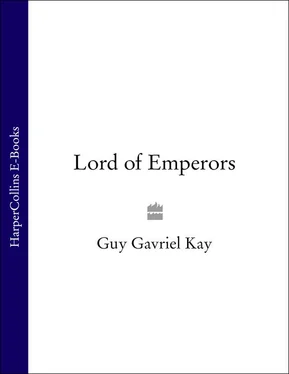‘An accident! Yes!’ cried the soldier, no calm in him at all. ‘Come! It is the King of Kings! An arrow!’
Poise deserted Rustem like conscripted soldiers facing Sarantine cavalry. One of his students gasped in shock. The woman with the afflicted eye collapsed to the floor in an untidy, wailing heap. Rustem stood up quickly, trying to order his racing thoughts. Four men had entered. An unlucky number. The woman made five. Could she be counted, to adjust the omens?
Even as he swiftly calculated auspices, he strode to the large table by the door and snatched his small linen bag. He hurriedly placed several of his herbs and pots inside and took his leather case of surgical implements. Normally he would have sent a student or a servant ahead with the bag, to reassure those in the fortress and to avoid being seen rushing out-of-doors himself, but this was not a circumstance that allowed for ordinary conduct. It is the King of Kings!
Rustem became aware that his heart was pounding. He struggled to control his breathing. He felt giddy, light-headed. Afraid, in fact. For many reasons. It was important not to show this. Claiming his walking stick, he slowed deliberately and put a hat on his head. He turned to the soldier. Carefully facing north, he said, ‘I am ready. We can go.’
The four soldiers rushed through the doorway ahead of him. Pausing, Rustem made an effort to preserve some order in the room he was leaving. Bharai, his best student, was looking at him.
‘You may practise with the surgical tools on vegetables, and then on pieces of wood, using the probes,’ Rustem said. ‘Take turns evaluating each other. Send the patients home. Close the shutters if the wind rises. You have permission to build up the fire and use oil for sufficient light.’
‘Master,’ said Bharai, bowing.
Rustem followed the soldiers out the door.
He paused in the garden and, facing north again, feet together, he plucked three shoots of bamboo. He might need them for probes. The soldiers were waiting impatiently in the roadway, agitated and terrified. The air pulsed with anxiety. Rustem straightened, murmured his prayer to Perun and the Lady and turned to follow them. As he did, he observed Katyun and Jarita at the front door of the house. There was fear in their eyes: Jarita’s were enormous, even seen at a distance. She stared at him silently, leaning against Katyun for support, holding the baby. One of the soldiers must have told the women what was happening.
He gave them both a reassuring nod and saw Katyun nod calmly back as she put her arm around Jarita’s shoulders. They would be all right. If he came back.
He went through the small gate into the road, taking his first step with his right foot, glancing up for any signs among the birds. None to be seen: they had all taken shelter from the rising wind. No omens there. He wished there hadn’t been four soldiers sent. Someone ought to have known better. Little to be done about that now, however. He would burn incense at the fortress, in propitiation. Rustem gripped his stick and struggled to present an appearance of equanimity. He didn’t think he was succeeding. The King of Kings. An arrow.
He stopped abruptly in the dusty road.
And in the moment he did so, cursing himself for a fool, preparing to go back to the treatment rooms, knowing how very bad an omen that would be, he heard someone speak from behind him.
‘Papa,’ said a small voice.
Rustem turned, and saw what his son was holding in both hands. His heart stopped for a moment then, or it felt as though it did. He swallowed, with sudden difficulty. Forced himself to take another deep breath, standing very still now just outside the gate.
‘Yes, Shaski,’ he said quietly. He looked at the small boy in the garden and a strange calm descended upon him. His students and the patients watched in a knotted cluster from the portico, the soldiers from the roadway, the women from the other doorway. The wind blew.
‘The man said . . . he said an arrow, Papa.’
And Shaski extended his two small hands, offering his father the implement he’d carried out into the yard.
‘He did say that, didn’t he?’ said Rustem, gravely. ‘I should take that with me then, shouldn’t I?’
Shaski nodded his head. His small form straight, dark brown eyes serious as a priest’s with an offering. He is seven years old, Rustem thought. Anahita guard him.
He went back through the wooden gate, and he bent and took the slender instrument in its leather sheath from the boy. He had brought it back from Ispahani, a parting gift from his teacher there.
The soldier had indeed said there was an arrow. Rustem felt a sudden, quite unexpected desire to lay a hand upon the head of his son, on the dark brown, curling hair, to feel the warmth, and the smallness. It had to do, of course, with the fact that he might not come back from the fortress. This might be a farewell. One could not decline to treat the King of Kings, and depending on where the arrow had lodged . . .
Shaski’s expression was so intense, it was as if he actually had some preternatural apprehension of this. He couldn’t, of course, but the boy had just saved him from the terrible auspice of having to re-enter the treatment room after walking out and taking his bamboo reeds, or sending someone back in for him.
Rustem found that he was unable to speak. He looked down at Shaski for another moment, then glanced over at his wives. There was no time to say anything to them, either. The world had entered through his doorway, after all. What was to be had long ago been written.
Rustem turned and went quickly back out through the gate and then with the soldiers up the steep road in the north wind that was blowing. He didn’t look back, knowing the omen attached to that, but he was certain that Shaski was still standing there and watching him, alone in the garden now, straight as a spear, small as a reed by a riverbank.
Vinaszh, son of Vinaszh, the military commander of the southern fortress of Kerakek, had been born even farther to the south, in a tiny oasis of palms east of Qandir, a sparse, spring-fed island of greenery with desert all around. It was a market village, of course. Goods and services exchanged with the dark, grim peoples of the sands as they came riding in on their camels and went back out again, receding and then disappearing on the shimmering horizon.
Growing up as a merchant’s son, Vinaszh came to know the nomadic tribes quite well, both in times of trade and peace and during those seasons when the Great King sent armies south in yet another fruitless attempt to force access to the western sea beyond the sands. The desert, at least as much as the wild tribesmen who shifted across its face, had made this impossible, again and again. Neither the sands nor those who dwelled there were inclined to be subdued.
But his childhood in the south had made Vinaszh— who had chosen the army over a merchant’s life—an excellent, obvious choice to take control of one of the desert fortresses. It represented a rare measure of clear thinking on the part of officials in Kabadh that he was, in fact, appointed to govern Kerakek when he attained sufficient rank, rather than being given command of, say, soldiers guarding a fishing port in the north, dealing with fur-clad traders and raiders from Moskav. Sometimes the military succeeded in doing things properly, almost in spite of itself. Vinaszh knew the desert, was properly respectful of it and those who dwelled there. He could manage some of the dialects of the nomads, spoke a little of the Kindath tongue, and was unruffled by sand in his bed or clothing or folds of skin.
Still, there was nothing at all in the background of the man to suggest that the soldier son of Vinaszh the trader might have had the rashness to speak up among the mightiest figures of Bassania and offer the uninvited suggestion that a small-town physician—one not even of the priestly caste—be summoned to the King of Kings where he was dying.
Читать дальше












